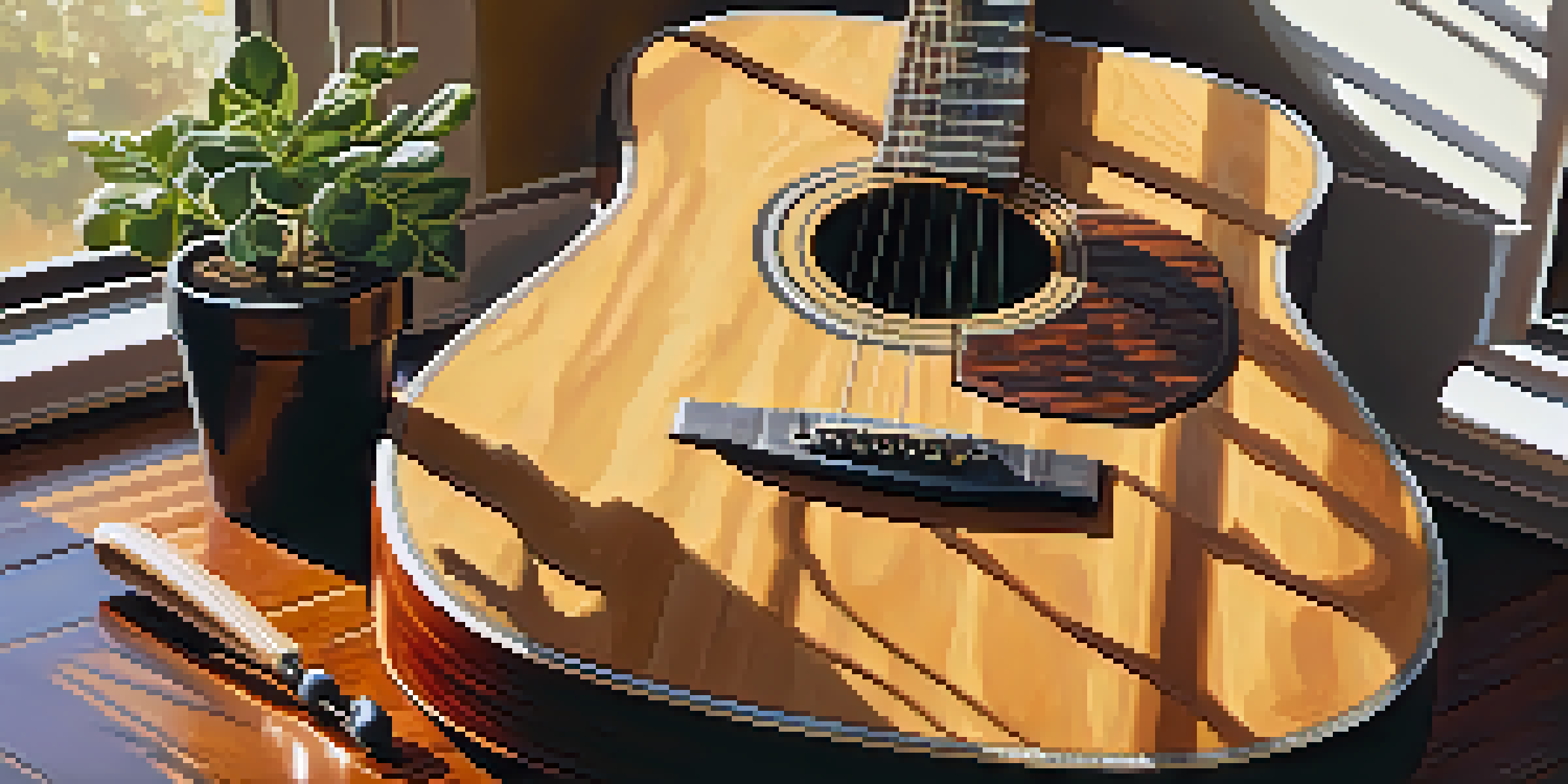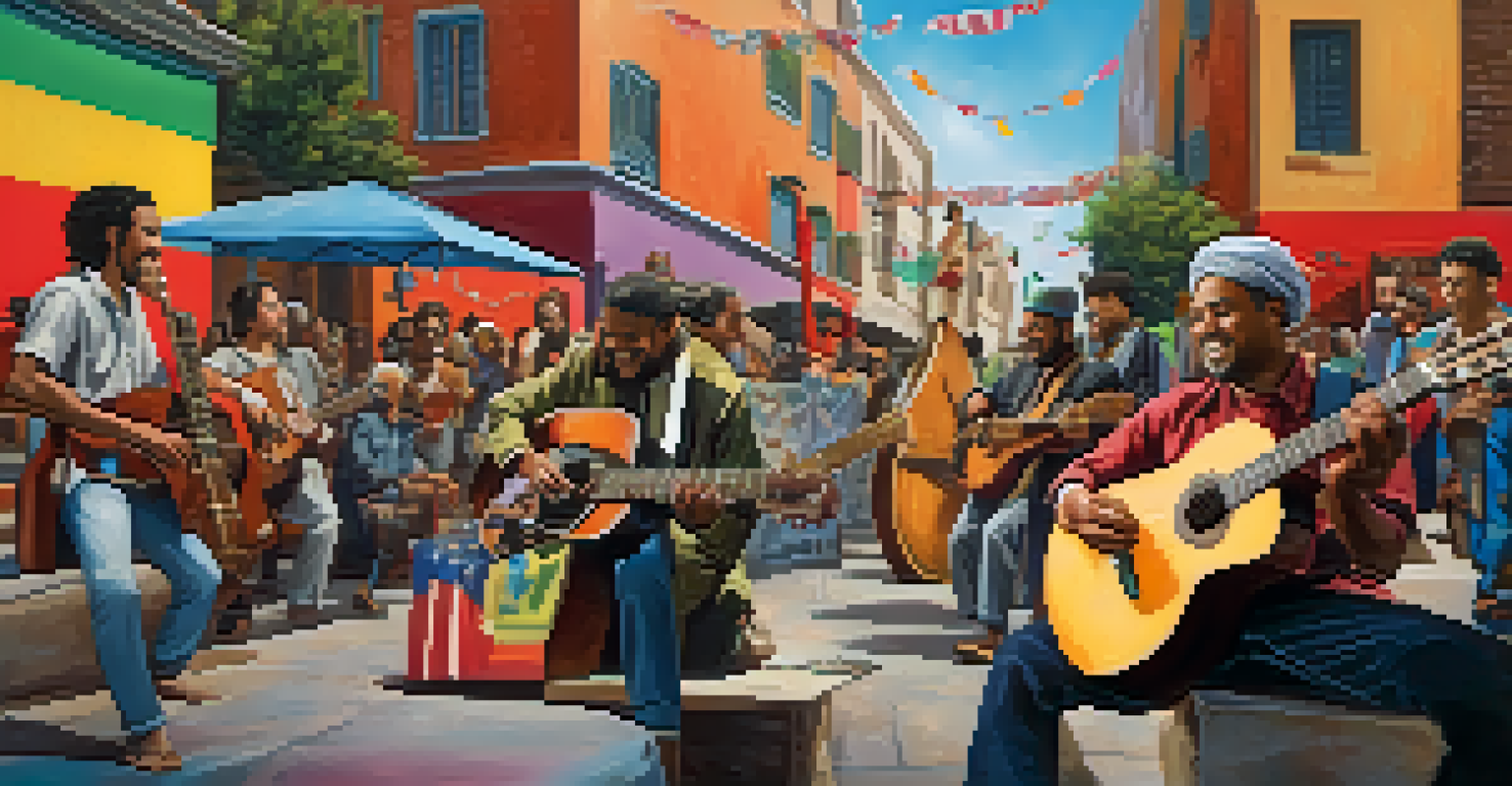Strumming Across Borders: The Global Language of Guitar

The Guitar: A Universal Instrument Across Cultures
The guitar, with its simple design and versatile sound, is a favorite around the globe. From the flamenco rhythms of Spain to the intricate fingerpicking of American folk, this instrument speaks a universal language. Each culture adds its own unique flavor, making the guitar a bridge between diverse musical traditions.
The guitar is a miniature orchestra in itself.
For instance, in Brazil, the guitar is central to bossa nova, blending jazz with samba to create a smooth, soothing sound. Meanwhile, in India, the guitar has been adapted to complement classical music, showcasing its ability to evolve and fit various contexts. This adaptability is what makes the guitar so universally beloved.
Ultimately, the guitar's ability to transcend borders lies in its accessibility and the emotional connection it fosters. Whether strumming a simple chord or executing complex solos, musicians from all walks of life find a common ground through this wonderful instrument.
Historical Roots: How the Guitar Spread Worldwide
The history of the guitar is as rich and diverse as the music it produces. Originating from ancient stringed instruments, the guitar evolved over centuries, traveling across continents through trade and migration. This journey is a testament to the instrument's adaptability and its ability to resonate with different cultures.

During the colonial era, European settlers brought the guitar to the Americas, where it blended with Indigenous and African musical traditions. This fusion gave birth to new genres like country, blues, and jazz, showcasing how the guitar adapted to its new environment. Each genre reflects the unique stories and experiences of the people who embraced it.
Guitar Connects Cultures Globally
The guitar serves as a universal instrument, bridging diverse musical traditions and fostering emotional connections across cultures.
As the world became more interconnected, the guitar's influence only grew. Today, you can find guitar styles that incorporate elements from around the world, proving that music is truly a global phenomenon.
Guitar Genres: A Melting Pot of Styles and Sounds
When we think of guitar music, numerous genres come to mind, each telling its own story. From rock and pop to classical and reggae, the guitar's versatility allows it to shine in many musical styles. Each genre not only showcases different playing techniques but also reflects the cultural backgrounds of its creators.
Music is the universal language of mankind.
For example, consider the energetic strumming of punk rock guitarists versus the intricate melodies of classical guitarists. Each style has its own unique techniques and emotional expressions, yet both share a common tool that unites them: the guitar. This rich tapestry of genres is a celebration of creativity that knows no bounds.
Moreover, genres are often interwoven, creating hybrid styles that further enrich the musical landscape. The blending of genres, like flamenco-rock or reggae-blues, illustrates how the guitar fosters innovation and collaboration across cultural lines.
The Role of Guitar in Cultural Identity and Expression
For many, playing the guitar is more than just a hobby; it's a means of expressing cultural identity. Musicians often use the guitar to convey their personal stories, traditions, and heritage. Whether it's a traditional folk song or a modern composition, the guitar serves as a voice for individuals and communities alike.
Take, for example, the role of the guitar in protest music. Throughout history, artists have used their guitars to voice dissent and advocate for change, proving that music can be a powerful tool for social justice. This connection between the guitar and cultural expression highlights its significance beyond mere entertainment.
Historical Evolution of the Guitar
The guitar's journey from ancient stringed instruments to modern musical styles showcases its adaptability and influence worldwide.
As a result, the guitar becomes a symbol of resilience and creativity, allowing individuals to connect with their roots while also reaching out to others. This dual role enriches the global music scene, showcasing the guitar as a vessel for both personal and collective narratives.
Global Collaboration: Guitarists Unite Across Borders
In our increasingly connected world, collaborations between guitarists from different cultures are blossoming. Musicians utilize technology to create music together, regardless of geographical boundaries. These partnerships often lead to exciting new sounds that celebrate diversity and innovation.
For instance, consider the collaboration between a flamenco guitarist from Spain and a blues musician from the United States. When they come together, they create a fusion that honors their roots while exploring new musical territories. This cross-cultural exchange not only enriches their individual artistry but also introduces audiences to fresh perspectives.
Moreover, global music festivals and online platforms have made it easier than ever for musicians to share their talents and collaborate. These interactions foster a sense of unity and community, reminding us that music, especially guitar music, knows no borders.
The Impact of Technology on Guitar Music Worldwide
Advancements in technology have transformed the way we create, share, and experience guitar music. With the rise of digital platforms, artists can easily distribute their music to a global audience. This accessibility has democratized the music industry, allowing even the most remote artists to showcase their talent.
Additionally, online tutorials and social media have enabled aspiring guitarists to learn from masters around the world. This wealth of resources fosters a sense of community among musicians, encouraging collaboration and exchange of ideas. The guitar is no longer confined to traditional learning methods; it's a world of creativity waiting to be explored.
Technology Shapes Guitar Music Today
Advancements in technology have transformed guitar music creation and sharing, empowering artists while also presenting new challenges.
However, while technology has its advantages, it also poses challenges, such as oversaturation of content. With countless artists vying for attention, standing out in the digital landscape can be tough. Yet, those who leverage technology creatively often find success, proving that innovation is key in the modern music world.
The Future of Guitar: Trends and Innovations Ahead
As we look to the future, the guitar continues to evolve, adapting to new musical trends and technological advancements. We see emerging genres that blend traditional guitar techniques with electronic elements, creating exciting new sounds. This fusion is a testament to the guitar's resilience and ability to inspire innovation.
Moreover, the rise of virtual reality and augmented reality experiences is opening new avenues for guitarists. Imagine attending a concert where you can interact with the musicians or even learn to play alongside them in a virtual space. These innovations promise to enhance the way we experience guitar music and connect with artists.

Ultimately, the future of the guitar is bright and full of possibilities. As long as people continue to strum, pick, and create, the guitar will remain a powerful instrument for connection and expression across borders.